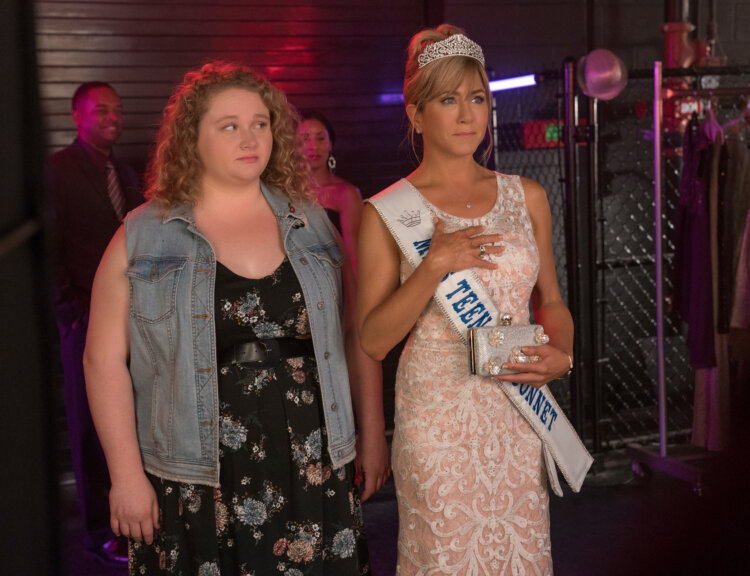
A few weeks ago, I picked up my 7-year-old daughter from school and excitedly told her that we were going to watch a new movie together after dinner. When we got home, I pulled up our Netflix queue and showed her the preview for Dumplin’, a movie about an overweight teenager named Willowdean, learning to be comfortable in her own skin. My daughter was skeptical at first, but soon became engrossed in the story. She even applauded the winners of the beauty pageant by the end of the film. For me, as a plus-size woman, I loved seeing unapologetically fat women on screen, and halfway through the movie I was crying tears of joy at seeing someone like me being depicted as fabulous and strong, as well as flawed and human.
My daughter is essentially my physical opposite. I’ve been short and fat for as long as I’ve been making memories, while my daughter has always been the tallest, thinnest kid in her class. I knew she was more likely to connect to Ellen, Willowdean’s svelte best friend, than any of the overweight women on screen. But I still felt an urgent, almost aching, need for her to watch this movie with me. I needed my daughter to watch it, not because she would see herself reflected in the story, but because she would see her mother in the beautiful, vibrant, plus-size women in Dumplin’.
The moment you first see yourself reflected in the characters of a story is a thing of magic. The first time she saw the movie Brave, my daughter said, “Mama, she has curly, curly hair just like me!” at least six times, even making me pause the movie so she could talk to me about Merida’s hair. I actively seek out entertainment for her with curious, sensitive, curly-haired girls so she can see herself reflected on the page or the screen, and know that her story is worth telling. I also seek out movies, books, and TV shows centered around funny, intelligent, attractive, fat women so she knows my story is worth telling, too.
Representation matters, and not just seeing versions of yourself in pop culture. You also need to see the people you love reflected in the entertainment you consume. We are subconsciously taught how society values our mothers, daughters, sisters, and friends by the way we see them portrayed in the media, often framing the way we think about them in relation to the world around us.
We don’t often think about it, but seeing people you don’t love or even know very well on screen is also a vital part of representation. For example, Whoopi Goldberg has shared how at 9 years old, seeing Nichelle Nichols on Star Trek inspired her to reach for the stars. Lieutenant Uhura not only inspired Whoopi, but has also helped shape the way people of all races thought about women of color, especially in the time her character premiered (1966), when there were few representations of black women—who weren’t in subservient or stereotypical roles—on TV.
We are subconsciously taught how society values our mothers, daughters, sisters, and friends by the way we see them portrayed in the media, often framing the way we think about them in relation to the world around us.
The same is true any time you see underrepresented characters on screen, including everyone from Peter Dinklage as Tyrion Lannister in Game of Thrones to Ginger Minj and Harold Perrineau as the effervescent drag queen in Dumplin’. When a movie like Dumplin’ shows fat women as multifaceted, vibrant women who are neither pathetic nor perfect, it shows them the same respect thin characters are given every single day. Willowdean is strong and beautiful, but at the same time she is forced to acknowledge herself as jealous and judgmental at times, learning to check her internal biases and grow as a person. She loves herself and at the same time is self-conscious about her body, no different than any other teenager, making her identifiable to women of any size. Seeing characters who are different than you portrayed as intelligent, valuable people (as opposed to filling a trope) is one of the many ways we learn that everyone is deserving of love and respect, not ridicule.
While it makes me sick to think about it, I know there will come a day when one of my daughter’s classmates will tease her because her mother is fat. They will tell “yo-mama” jokes, laughing about how I sit “around” the house, making hurtful comments about something she has no control over. I can’t change those kids or the jokes they will make, but I can give my daughter characters like Willowdean. I can give her actresses like Gabourey Sidibe, Chrissy Metz and Queen Latifah. I can give her Tracy Turnblad, Sookie St. James and Fat Amy on screen, while Adele, Aretha Franklin and Elle King play on our radio. I can surround her with beautiful, talented women of all shapes and sizes, so that when the inevitable comments are made, her reaction isn’t one of hurt but of confusion, because it would never occur to her that somebody’s weight is a thing to make fun of in the first place.
Perhaps, if we are very lucky, those kids are also growing up watching Dumplin’ and Hairspray and Vicar of Dibley. Maybe the idea of someone who is fat being just as amazing as someone who is thin won’t seem radical to them. However, even if the other kids never figure out that a person’s size isn’t a measure of their worth, my daughter will know, thanks to these movies.


Grok Nation Comment Policy
We welcome thoughtful, grokky comments—keep your negativity and spam to yourself. Please read our Comment Policy before commenting.